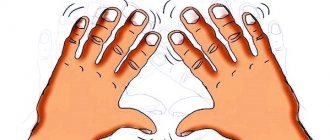.
The disease, known as anorexia nervosa, is mostly diagnosed in adolescents and young women. A feature of the disease is a lack of appetite and the process of deliberately refusing food. The consequence is a critical loss of body weight, which in some cases can cause death.
Anorexia is a refusal to eat that can be fatal.
It is worth keeping in mind that the development of such a pathological process is psychological in nature. This requires a comprehensive approach to the treatment of anorexia nervosa. According to the International Classification of Diseases, Tenth Revision, this disease is assigned code F 50.0.
Symptoms and signs of anorexia
Anorexia nervosa is characterized by an unrelenting desire for thinness, a painful fear of obesity, and a distorted perception of one’s own body, which ultimately leads to very low weight. The diagnosis is made based on clinical data in cases where the weight is below 15% of the body mass index.
When diagnosed with anorexia, symptoms may include the following:
- weight deficiency is determined visually;
- depression and irritability are observed, which are replaced by euphoria;
- unreasonable resentment or anger manifests itself;
- there are problems with sleep;
- the condition of nails, hair, and skin deteriorates sharply;
- weakness, fatigue, nervousness are observed:
- often vomiting after eating;
- Women lack menstruation and have decreased libido.
Signs of anorexia may also indicate a problem:
- the patient may perform certain rituals when eating or refuse to eat;
- the patient tries not to eat in public or consumes strange foods;
- the patient uses laxatives or weight loss supplements;
- there is an obsession with training;
- the patient avoids social contacts.
The disease is diagnosed based on clinical data. Not only the patient himself, but also his relatives who notice signs of anorexia can consult a doctor.
Symptomatic picture of the disease
Anorexia, which appears due to stress, has its own clinical picture. The development of symptoms may be influenced by the age of the patient. Manifestations of the clinical picture of anorexia due to nervousness can be noticed during the first two stages of the disease. The set of symptoms looks like this:
- There is a categorical refusal, which manifests itself gradually in the patient.
- The skin becomes pale, nails become brittle, and hair begins to fall out.
- The patient often feels dizzy.
- The frequency of fainting increases.
- Heart rhythm is disturbed.
- The whole body feels cold.
- A person’s existing chronic diseases become aggravated.
- The menstrual cycle in women is disrupted, gradually disappearing altogether.
- A person becomes overly sensitive to any physical influences.
- Various psychological disorders are observed (sudden mood swings for no reason, apathy towards everything that surrounds the patient, people become depressed, thoughts of suicide appear).
- Feeling weak and drowsy.
As mentioned earlier, children during adolescence may suffer from anorexia nervosa. The onset of the disease can be recognized by a set of specific symptoms.
They are somewhat different from the symptoms of this disease in older people, but there are similarities. The disease in adolescents manifests itself as follows:
- Dissatisfaction with your figure, panic fear of gaining weight or becoming obese.
- The teenager begins to carefully calculate calories.
- As a result of an acute desire to lose weight, radical diets are used.
- The teenager begins to take laxatives or diuretics. The patient can also take special weight loss medications.
- Human behavior changes. A refusal of the usual pastime may occur, and interest in life in general may disappear.
- Apathy, irritability, aggression, and mood swings for no reason develop.
- The limbs constantly feel cold.
- The teenager sharply denies his pathological weight loss.
- A person develops a feeling of aversion to food. He feels nauseous or wants to vomit every time after eating even the smallest amount of food.
The disease known as anorexia nervosa is fairly easy to recognize. Typically, all clinical manifestations are quite specific for any age category. The main thing is to notice them in time and take appropriate measures to solve the problem before irreversible consequences occur.
Causes
Doctors have not yet been able to determine exactly why anorexia occurs. It is now known how young women and adolescents develop anorexia. In girls and young women, the most common causes of pathology are the desire to have the appearance of models or movie stars, as well as unhappy love. Anorexia in men in most cases occurs as a result of stress, with manifestations of perfectionism (the desire to look perfect at any cost), with self-doubt, with chronic diseases.
The disease can occur as a result of an episode that leaves a strong imprint on the psyche. Among the emotional and mental problems that most often stimulate the development of the disease, the main ones are:
- relationship codependency;
- reluctance to grow up;
- inability to express emotions;
- fear or severe anxiety;
- constant stress;
- low self-esteem;
- perfectionism;
- misunderstanding.
Among the physical causes of the disease, the most common are:
- oncological diseases;
- stomach ulcer;
- presence of parasites;
- hormonal disorders.
Etiology
Anorexia nervosa develops in a person for a reason. The appearance of this disease and its further progress are influenced by many factors, which can be divided into risk factors and etiological causes. Each of the groups of causes of anorexia nervousness reveals in its own way the origin of this disease, which is dangerous not only for young women. To date, the following etiological factors for the development of anorexia are known:
- Exerting an impact on a person that is psychological in nature (insults, negative statements regarding figure and weight).
- Presence of psychological illnesses.
- Pathological fear of gaining weight.
- Disharmonious teenage crisis.
- Impact on a person from the environment.
But these are not all events, conditions and behavioral lines, due to the influence of which a person may develop anorexia nervosa. The disease can also manifest itself due to the influence of certain causes, combined into a group of risk factors. Currently, experts identify the following risks for the development of anorexia:
- Genetic. Excessive weight loss and refusal to eat can be triggered by activation of the 1p34 gene. The influence of the gene begins after a person experiences excessive tension in the nervous system or under severe stress.
- Family. If a person's relatives have suffered from this disease, the risk of its occurrence becomes higher.
- Personal. People with low self-esteem are more likely to develop anorexia. People who are overly susceptible to pressure and negative criticism can also suffer from the disease.
- Anthropological. This risk factor refers to a person’s fear of eating normally.
- Social. People who want to imitate others or follow fashion trends are more likely to suffer from the disease.
Despite such a wide list of reasons why the disease can develop, most often the progression of the disease occurs as a result of prolonged psychological pressure, as well as following modern fashion trends.
Risk factors
Anorexia as a disease in the vast majority of cases manifests itself in females under 40 years of age.
The main risk factors are:
- the patient is the only child in the family;
- presence of teenage conflicts;
- desire to dominate the family;
- heredity;
- excessive concern for loved ones;
- involvement in conflicts against one's will;
- lack of trusting relationships;
- difficult relationships or separation from loved ones;
- influence of social networks;
- dissatisfaction with oneself;
- low self-esteem.
Complications
Without qualified medical care, anorexia disease can lead to serious complications and have very unpleasant consequences. In the absence of sufficient energy, the human body slows down processes to conserve energy, going into starvation mode. In fact, the body begins to eat its cells, as a result of which mental abilities, psyche, and internal organs suffer.
Depending on the stage of anorexia, the following consequences are noted:
- decreased heart rate and decreased blood pressure;
- constant chills;
- interruption of the menstrual cycle or deterioration in the functioning of the reproductive system;
- dry skin and hair, brittle hair and nails;
- development of liver and kidney diseases.
The most serious complications arise in the hormonal sphere due to decreased production of:
- estrogen, responsible for the health of bones, cartilage, blood vessels, heart, etc.
- dehydroepiandrosterone, which is responsible for reproductive function in women and slows down the aging process;
- thyroid hormones that regulate metabolic processes in the body, which leads to metabolic disorders, muscle degradation, and bone fragility.
An increase in the level of cortisol (stress hormone) leads to a slowdown in protein synthesis, skin diseases and allergic reactions.
Anorexia can cause the following complications:
- disorders of the immune system (decreased body resistance, hair loss, teeth loss, etc.);
- cardiovascular diseases;
- lack of fluid in the body;
- problems with the musculoskeletal system (osteoporosis);
- infertility;
- blood diseases (anemia);
- diseases of the digestive system;
- dystrophy.
In later stages, almost all major systems of the body are affected.
When to see a doctor
If anorexia is suspected, the symptoms of which may vary, consult a doctor immediately. Treatment of anorexia is the specialty of a psychotherapist, who, if necessary, can refer the patient to an endocrinologist, psychiatrist, dermatologist, gastroenterologist, or nutritionist.
The best results are obtained by consulting a doctor at the first stage of the disease, which is manifested by a stable decrease in body weight. At the second stage, apathy, loss of appetite, development of depression, complaints of excess weight, taking laxatives and vomiting after eating are observed. At the third stage of anorexia, the patient loses activity, fainting and chills are observed, and the body rejects food. Patients with anorexia most often refuse to admit that they have a problem, so close people of the patient are advised to consult a doctor and prepare for a visit to the patient. Anorexia, the causes of which can be different, develops very quickly, so you can’t hesitate.
JSC "Medicine" (academician Roitberg's clinic) in Moscow offers the services of qualified psychotherapists in the field of treatment of anorexia. You can get more information about the clinic’s doctors and make an appointment online on the website or by calling +7(495)995-00-33. Clinic address: 2nd Tverskoy-Yamskoy lane, building 10.
The nuances of treating anorexia in adolescents
In order to help the child cope with the problem, parents should adhere to the following recommendations:
- Be a role model for your child by adhering to a healthy lifestyle;
- maintain your figure through sports;
- do not criticize the child’s appearance and your own;
- get advice from a psychologist;
- do not intimidate the child or show anger towards him;
- increase his self-esteem.
Having noticed the first signs of anorexia in a child, parents should immediately seek help from a doctor. Manifestations such as weight loss, as well as refusal of food that the child previously ate with pleasure should be alarming. Teenagers may refuse to eat, citing a lack of appetite or the fact that they had previously eaten a lot.
If a teenager is very concerned about diets and criticizes his body, then this should also alert parents. He may react sharply to comments about food or criticism.
Diagnosis of anorexia
If a patient is suspected of having anorexia, the clinic offers modern methods for diagnosing the disease. Diagnosis of pathology begins during the first appointment, during which the doctor conducts a survey, collects anamnesis and gives a referral for tests (tests for thyroid hormones and sugar). If necessary, the psychotherapist refers to other specialists, including a gynecologist, to determine the cause of the absence of menstruation.
JSC "Medicine" (academician Roitberg's clinic) has the latest laboratory and diagnostic equipment to conduct a comprehensive examination.
Treatment
The fight against anorexia requires the involvement, in addition to a psychiatrist, of a number of specialists from other areas of medicine. Various methods are used in the treatment process:
- psychiatric;
- medicinal;
- physiotherapeutic.
The doctor makes a decision on how to treat anorexia based on examination data, the individual characteristics of the patient, including his age category. If necessary, referral to a hospital for round-the-clock monitoring is possible. JSC "Medicine" has a well-equipped hospital with comfortable rooms. Hospitalization in most cases is prescribed if there is an urgent need to regain weight or for serious mental problems.
Patients are prescribed enriched nutrition and psychotherapy. In some cases, the latest generation of antipsychotics. Consultations with a nutritionist are required to help develop a diet. Treatment of children and adolescents is possible at home. In adolescents, the so-called “family treatment” demonstrates excellent results.
Family
Most often, the causes of anorexia lie in childhood. For example, this is how a dual attitude towards parents manifests itself due to harsh upbringing, corporal punishment, and other forms of violence. Anorexic, on the one hand, hates his parents for the torment they cause, but on the other hand, he loves them. Refusal to eat is a manifestation of hidden aggression.
Refusing to eat can also mean trying to gain control when there is a strong fear of losing it. The impetus in this case is the divorce of parents, the death of one of the relatives or separation.
As a rule, all anorexics have difficult relationships with their parents, in particular with their mother:
- For example, conditions are unfavorable when the mother has hysterical accentuations of character and high demands on the child, leadership is cultivated everywhere and in everything, and an ideal figure. At the time of the child’s illness, these character traits of the mother become even more acute, which leads to even more pronounced and destructive conflicts.
- The prognosis is equally unfavorable in a family where the mother has paranoid accentuations and follows the myth of an ideal family. The child is subject to high, primarily moral, demands. Following the myth of a prosperous family, the mother for a long time protects the child from others and especially psychiatrists, finds supposedly rational explanations for behavioral changes, and selects treatment herself. When it is no longer possible to ignore the problem, the disease reaches severe and advanced stages, and the mother simply abandons the child.
- In a symbiotic relationship (found in single-parent families), the mother supports any word and choice of the child. She denies the child’s anorexia and even in the final stages helps in “finding an ideal body,” continuing to work or study, and ignoring seeking help from specialists.
- In conflict families, where the father is an aggressor and the mother is timid, the child is subjected to indulgence from the mother and severe physical punishment from the father. He tries to force the child to stop “bullying” (eating disorder). In isolated cases, parents eventually unite and help the child recover. More often, one of his caring relatives refers him for treatment.
Initially problematic relationships with parents and their even greater deterioration at the time of illness make it difficult to treat anorexia. Family psychotherapy is required.
In men, additional ground for the development of anorexia in the future is created by hereditary schizophrenia, schizoid psychopathy, delusional psychoses, anxious depression, character abnormalities, phobias and alcoholism.
Mara Selvini Palazzoli, one of the founders of the Milan Institute of Family Psychotherapy, developed the theory of anorexia as a family disease. A portrait of such a family includes:
- absence of a leader in the family, subordination of behavior to external factors;
- open cooperation is contrary to family morals;
- None of the family members takes responsibility for the gradually accumulating problems.
In addition, the specifics of an anorexic family are as follows:
- The family is not flexible; the idea of fidelity and devotion to the family is stronger than the idea of self-realization and personal independence.
- The child develops perfectionism and obsessive-compulsive behavior due to the desire to win the love and attention of parents.
- Overprotection prevails in the family, the child is deprived of autonomy. His life and every action is controlled by “caring” parents. Selflessness towards the family, loyalty, and its protection are encouraged. Initiative and objections are regarded as betrayal.
- Relationships outside the family are frowned upon and strictly controlled.
- Intrafamily boundaries are blurred, but external boundaries are strictly defined. Coalitions are often formed with the older generation; the child is used as a means of avoiding conflicts between generations.
- Family priorities are nutrition and somatic functions.
Thus, in general, four mechanisms for the development of anorexia can be distinguished (two internal and two external):
- Hunger is a means of fighting parents. Not receiving attention and love through acceptable behavior, the child forces his parents to worry about his health and force him to eat.
- Excessive parental coercion regarding nutrition, control, and punishment provoke loss of appetite and vomiting.
- Anxiety is caused by the thought of real or fictitious obesity and remarks from others about a sharp and pronounced change in weight (including in terms of weight loss). Anxiety causes decreased appetite.
- Hunger causes biochemical processes that are perceived as an anxiety state. Without feeling hungry, but experiencing this state, an anorexic person refuses food with special zeal.
Almost all psychoanalysts claim that food is subconsciously perceived as safety, love, pleasure. The desire to bite is a manifestation of oral aggression (innate aggression). With the development of conscience, these tendencies cause a feeling of guilt and the need for self-punishment, which is manifested by refusal of food.
How to make an appointment with a psychotherapist
To make an appointment with a psychotherapist at our clinic, you can use any of the following methods:
- online form on the website;
- multi-line telephone (24/7).
If necessary, you can call an ambulance by phone.
JSC "Medicine" (clinic of academician Roitberg) is located in the center of Moscow at the address 2nd Tverskoy-Yamskaya lane, building 10. The clinic is located near the metro stations "Mayakovskaya", "Tverskaya", "Chekhovskaya", "Belorusskaya".










